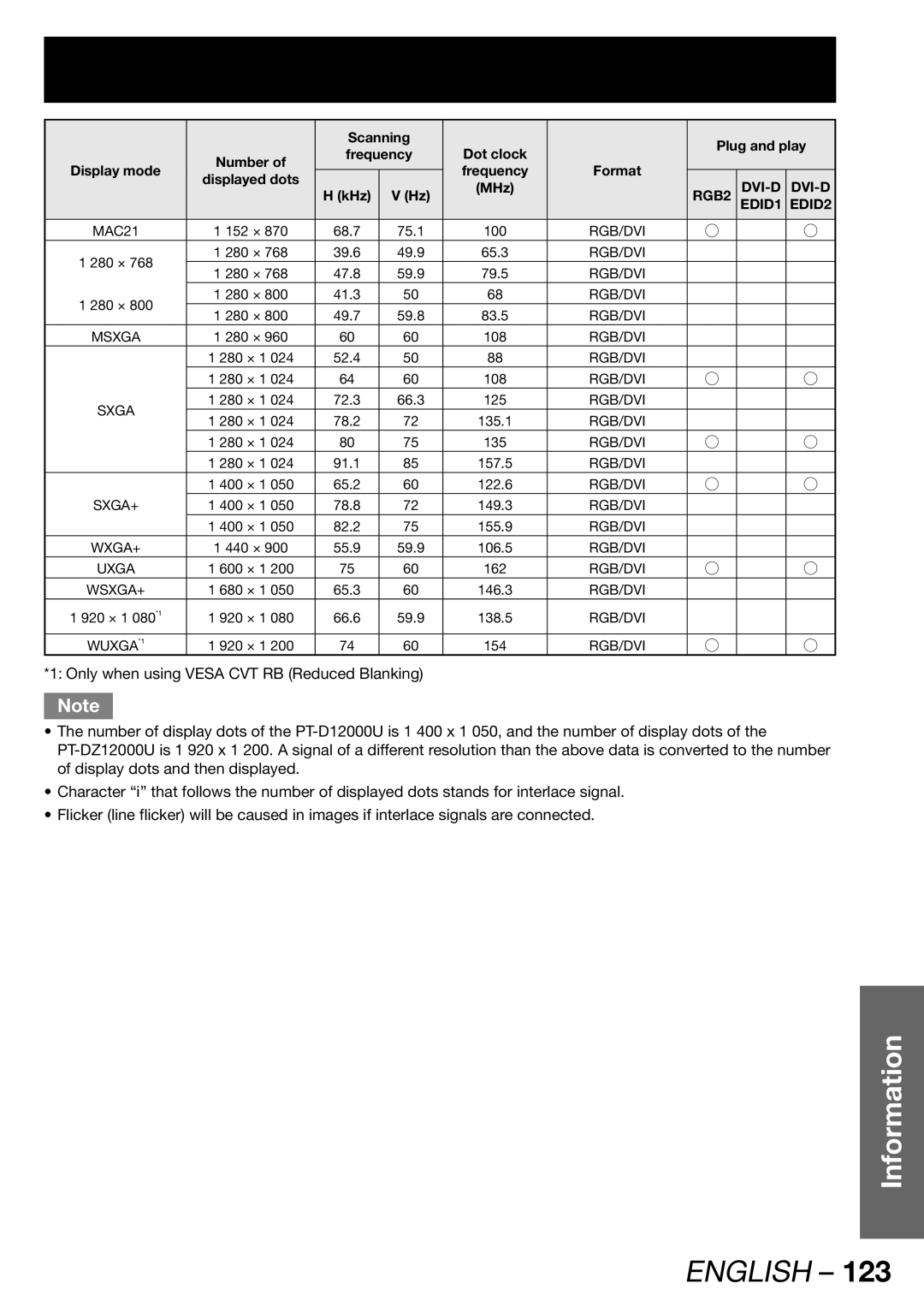
|
| Scanning | Dot clock |
| Plug and play | |||
| Number of | frequency |
| |||||
|
|
|
|
| ||||
Display mode |
|
| frequency | Format |
|
|
| |
displayed dots |
|
|
| |||||
| H (kHz) | V (Hz) | (MHz) |
| RGB2 | |||
|
|
| ||||||
|
|
|
|
|
|
| EDID1 | EDID2 |
MAC21 | 1 152 × 870 | 68.7 | 75.1 | 100 | RGB/DVI | ◯ |
| ◯ |
1 280 × 768 | 1 280 × 768 | 39.6 | 49.9 | 65.3 | RGB/DVI |
|
|
|
1 280 × 768 | 47.8 | 59.9 | 79.5 | RGB/DVI |
|
|
| |
|
|
|
| |||||
1 280 × 800 | 1 280 × 800 | 41.3 | 50 | 68 | RGB/DVI |
|
|
|
1 280 × 800 | 49.7 | 59.8 | 83.5 | RGB/DVI |
|
|
| |
|
|
|
| |||||
MSXGA | 1 280 × 960 | 60 | 60 | 108 | RGB/DVI |
|
|
|
| 1 280 × 1 024 | 52.4 | 50 | 88 | RGB/DVI |
|
|
|
| 1 280 × 1 024 | 64 | 60 | 108 | RGB/DVI | ◯ |
| ◯ |
SXGA | 1 280 × 1 024 | 72.3 | 66.3 | 125 | RGB/DVI |
|
|
|
1 280 × 1 024 | 78.2 | 72 | 135.1 | RGB/DVI |
|
|
| |
|
|
|
| |||||
| 1 280 × 1 024 | 80 | 75 | 135 | RGB/DVI | ◯ |
| ◯ |
| 1 280 × 1 024 | 91.1 | 85 | 157.5 | RGB/DVI |
|
|
|
| 1 400 × 1 050 | 65.2 | 60 | 122.6 | RGB/DVI | ◯ |
| ◯ |
SXGA+ | 1 400 × 1 050 | 78.8 | 72 | 149.3 | RGB/DVI |
|
|
|
| 1 400 × 1 050 | 82.2 | 75 | 155.9 | RGB/DVI |
|
|
|
WXGA+ | 1 440 × 900 | 55.9 | 59.9 | 106.5 | RGB/DVI |
|
|
|
UXGA | 1 600 × 1 200 | 75 | 60 | 162 | RGB/DVI | ◯ |
| ◯ |
WSXGA+ | 1 680 × 1 050 | 65.3 | 60 | 146.3 | RGB/DVI |
|
|
|
1 920 × 1 080*1 | 1 920 × 1 080 | 66.6 | 59.9 | 138.5 | RGB/DVI |
|
|
|
|
|
|
|
|
|
|
|
|
WUXGA*1 | 1 920 × 1 200 | 74 | 60 | 154 | RGB/DVI | ◯ |
| ◯ |
*1: Only when using VESA CVT RB (Reduced Blanking)
Note
•The number of display dots of the
•Character “i” that follows the number of displayed dots stands for interlace signal.
•Flicker (line flicker) will be caused in images if interlace signals are connected.
Information
